不用被动语态的N种情况.
- 格式:doc
- 大小:21.00 KB
- 文档页数:3
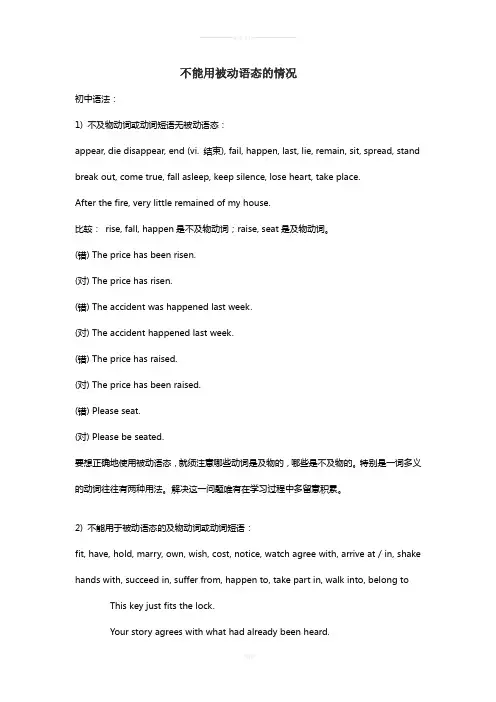
不能用被动语态的情况初中语法:1) 不及物动词或动词短语无被动语态:appear, die disappear, end (vi. 结束), fail, happen, last, lie, remain, sit, spread, stand break out, come true, fall asleep, keep silence, lose heart, take place.After the fire, very little remained of my house.比较:rise, fall, happen是不及物动词;raise, seat是及物动词。
(错) The price has been risen.(对) The price has risen.(错) The accident was happened last week.(对) The accident happened last week.(错) The price has raised.(对) The price has been raised.(错) Please seat.(对) Please be seated.要想正确地使用被动语态,就须注意哪些动词是及物的,哪些是不及物的。
特别是一词多义的动词往往有两种用法。
解决这一问题唯有在学习过程中多留意积累。
2) 不能用于被动语态的及物动词或动词短语:fit, have, hold, marry, own, wish, cost, notice, watch agree with, arrive at / in, shake hands with, succeed in, suffer from, happen to, take part in, walk into, belong to This key just fits the lock.Your story agrees with what had already been heard.3) 系动词无被动语态:appear, be become, fall, feel, get, grow, keep, look, remain, seem, smell, sound, stay, taste, turnIt sounds good.4) 带同源宾语的及物动词,反身代词,相互代词,不能用于被动语态:die, death, dream, live, lifeShe dreamed a bad dream last night.5) 当宾语是不定式时,很少用于被动语态。
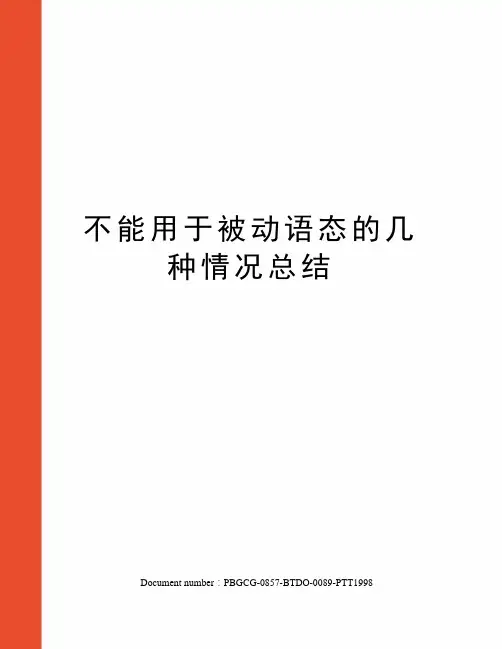
不能用于被动语态的几种情况总结Document number:PBGCG-0857-BTDO-0089-PTT1998不能用于被动语态的几种情况总结四川省阆中中学校任金石1、there be 结构及所有的不及物动词或动词短语充当谓语时,无被动语态。
:There are twelve moths in a year,Many of his songs have remained popular as ever,他的许多歌曲和以往一样仍然很流行。
Winning the medal is like a dream come true.获得奖牌好比梦想成真。
注:常见的不及物动词或动词短语有:appear, die, happen, lie(躺;位于), remain, occur, come true, break out, take place 等。
2、表示“状态”的谓语动词,如:last, hold, benefit, contain, equal, fit, join, mean, look like, consist of 等不能用被动语态。
:Each game lasts about an hour.每场比赛约一小时。
The committee consists of ten members.委员会由十人组成。
3、表示“归属”的动词,如have,own,belong to 等。
:We have three meals a day.我们一日吃三餐。
These islands belong to Spain.这些岛屿隶属西班牙。
4、表示“希望、意图”的动词,如wish,want,hope,like,love,hate等。
:But I hate autumn and winter。
但是我讨厌秋天和冬天。
5、宾语是反身代词或相互代词时谓语动词用主语语态,不能用被动语态。
:We should help each other.I found myself unable to speak.我发现自己说不出话了。
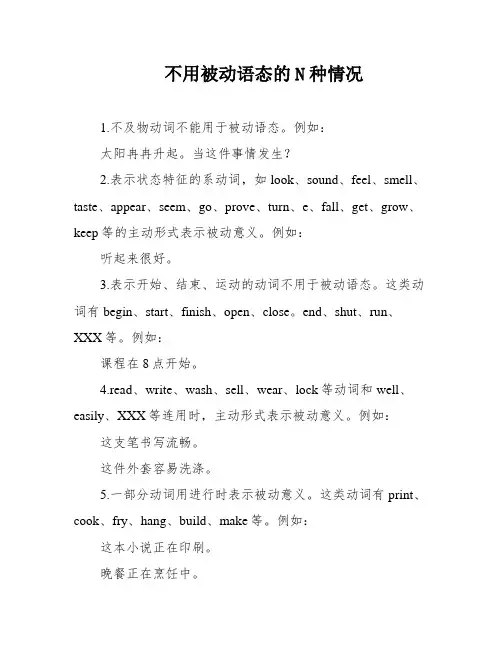
不用被动语态的N种情况1.不及物动词不能用于被动语态。
例如:太阳冉冉升起。
当这件事情发生?2.表示状态特征的系动词,如look、sound、feel、smell、taste、appear、seem、go、prove、turn、e、fall、get、grow、keep等的主动形式表示被动意义。
例如:听起来很好。
3.表示开始、结束、运动的动词不用于被动语态。
这类动词有begin、start、finish、open、close。
end、shut、run、XXX等。
例如:课程在8点开始。
4.read、write、wash、sell、wear、lock等动词和well、easily、XXX等连用时,主动形式表示被动意义。
例如:这支笔书写流畅。
这件外套容易洗涤。
5.一部分动词用进行时表示被动意义。
这类动词有print、cook、fry、hang、build、make等。
例如:这本小说正在印刷。
晚餐正在烹饪中。
6.need、want、require、deserve等动词以物做主语时,后接动名词的主动形式表示被动意义。
我的手表需要修理。
谁说那男孩应该受到惩罚。
7.宾语是反身代词、相互代词、同源宾语时,不用被动语态。
例如:我自学英语。
我们互相帮助。
他们过着幸福的生活。
8.一部分及物动词不用于被动语态。
常见的有:fit、have、wish、cost、leave、enter、reach、suit、benefit(受益)、lack、own等。
例如:他走进房间并拿起了他的书。
我有一本书。
Some phrasal verbs cannot be used in passive voice。
such as breakout。
take place。
lose heart。
come true。
belong to。
consist of。
add up to。
agree with。
arrive at/in。
shake hands with。
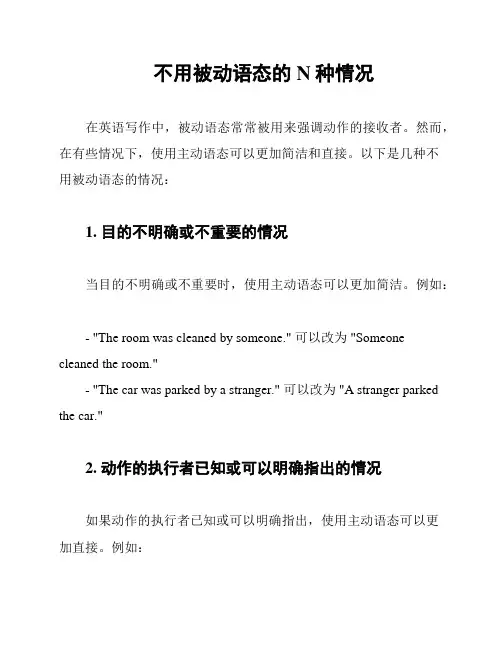
不用被动语态的N种情况在英语写作中,被动语态常常被用来强调动作的接收者。
然而,在有些情况下,使用主动语态可以更加简洁和直接。
以下是几种不用被动语态的情况:1. 目的不明确或不重要的情况当目的不明确或不重要时,使用主动语态可以更加简洁。
例如:- "The room was cleaned by someone." 可以改为 "Someone cleaned the room."- "The car was parked by a stranger." 可以改为 "A stranger parked the car."2. 动作的执行者已知或可以明确指出的情况如果动作的执行者已知或可以明确指出,使用主动语态可以更加直接。
例如:- "The report was written by John." 可以改为 "John wrote the report."- "The cake was baked by my mother." 可以改为 "My mother baked the cake."3. 动作执行者不重要的情况当动作执行者并不重要时,使用主动语态可以更加简洁。
例如:- "The package was delivered yesterday." 可以改为 "The package arrived yesterday."- "The decision was made last week." 可以改为 "The decision was taken last week."4. 强调动作执行者的情况有时候,我们希望强调动作执行者,使用主动语态可以更加有效。
例如:- "The painting was created by Picasso." 可以改为 "Picasso created the painting."不过需要注意的是,有些情况下使用被动语态可以更准确地表达意思。
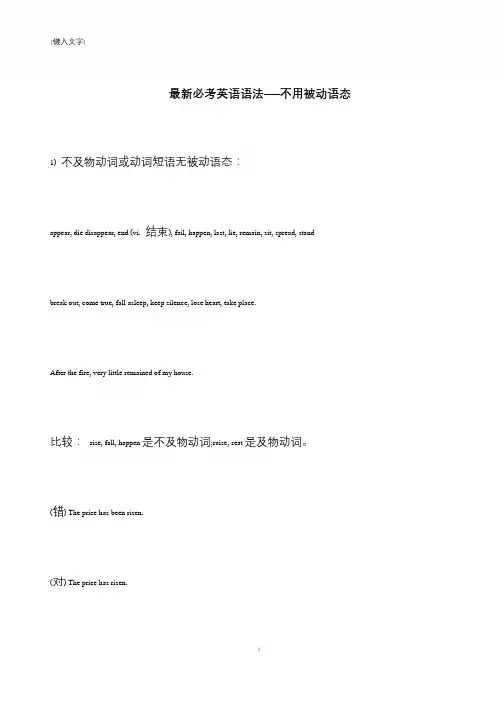
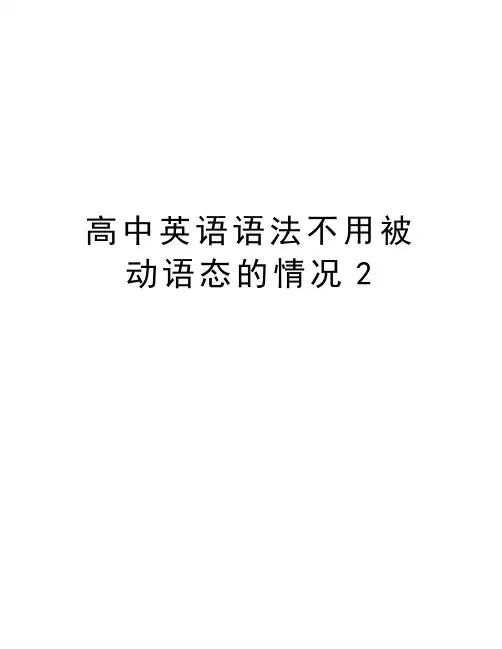
高中英语语法不用被动语态的情况2不用被动语态的情况一、不及物动词或动词短语无被动语态:常见的不及物动词:appear, die disappear, end (vi. 结束), fail, happen, last, lie, remain, sit, spread, standbreak out, come true, fall asleep, keep silence, lose heart, take place.比较:rise, fall, happen是不及物动词;raise, seat是及物动词。
(错) The price has been risen. (对). (错) The accident was happened last week.(对)(错) The price has raised.(对)(错) Please seat. (对)(错)After the fire, nothing was remained.(对)要想正确地使用被动语态,就须注意哪些动词是及物的,哪些是不及物的。
特别是一词多义的动词往往有两种用法。
解决这一问题唯有在学习过程中多留意积累。
二、不能用于被动语态的及物动词或动词短语有一些及物动词,尽管他们的后面跟了宾语,但是也不能用于被动语态:fit, have, hold, marry, own, wish, cost, notice, watch agree with, arrive at / in, shake hands with, succeed in, suffer from, happen to, take part in, walk into, belong to例:This key just fits the lock. Your story agrees with what had already been heard.(错)The room was entered by her just now.(对)(错)The queue was jumped by Tom. (对)(错)He isn’t agreed with by me. (对)三、系动词无被动语态:常用的系动词有:1、状态类 2、状态保持不变 3、状态改变4、与感官有关的5、好象6、结果类的例:It sounds good.The building looks very beautiful. Your idea proved to be wrong.四、带同源宾语的及物动词,宾语为反身代词,相互代词或者不定式,不能用于被动语态:die, death, dream, live这几个动词常跟同源宾语。
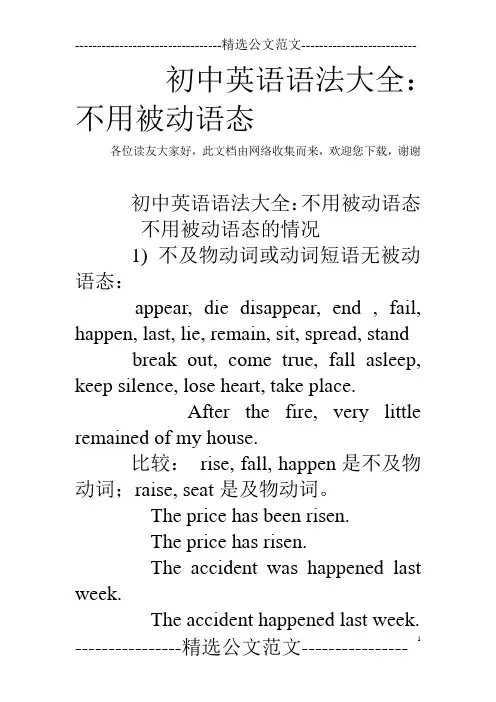
初中英语语法大全:不用被动语态各位读友大家好,此文档由网络收集而来,欢迎您下载,谢谢初中英语语法大全:不用被动语态不用被动语态的情况1) 不及物动词或动词短语无被动语态:appear, die disappear, end , fail, happen, last, lie, remain, sit, spread, stand break out, come true, fall asleep, keep silence, lose heart, take place.After the fire, very little remained of my house.比较:rise, fall, happen是不及物动词;raise, seat是及物动词。
The price has been risen.The price has risen.The accident was happened last week.The accident happened last week.The price has raised.The price has been raised.Please seat.Please be seated.要想正确地使用被动语态,就须注意哪些动词是及物的,哪些是不及物的。
特别是一词多义的动词往往有两种用法。
解决这一问题唯有在学习过程中多留意积累。
2) 不能用于被动语态的及物动词或动词短语:fit, have, hold, marry, own, wish, cost, notice, watch agree with, arrive at / in, shake hands with, succeed in, suffer from, happen to, take part in, walk into, belong toThis key just fits the lock.Your story agrees with what had already been heard.3) 系动词无被动语态:appear, be become, fall, feel, get,grow, keep, look, remain, seem, smell, sound, stay, taste, turnIt sounds good.4) 带同源宾语的及物动词,反身代词,相互代词,不能用于被动语态:die, death, dream, live, lifeShe dreamed a bad dream last night.5) 当宾语是不定式时,很少用于被动语态。

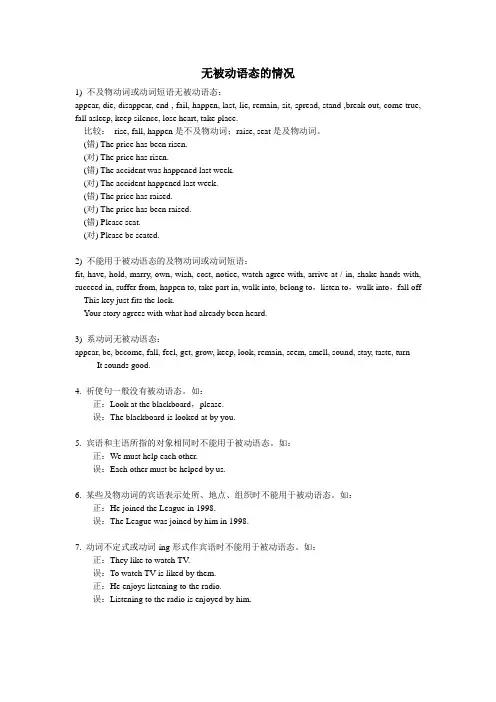
无被动语态的情况1) 不及物动词或动词短语无被动语态:appear, die, disappear, end , fail, happen, last, lie, remain, sit, spread, stand ,break out, come true, fall asleep, keep silence, lose heart, take place.比较:rise, fall, happen是不及物动词;raise, seat是及物动词。
(错) The price has been risen.(对) The price has risen.(错) The accident was happened last week.(对) The accident happened last week.(错) The price has raised.(对) The price has been raised.(错) Please seat.(对) Please be seated.2) 不能用于被动语态的及物动词或动词短语:fit, have, hold, marry, own, wish, cost, notice, watch agree with, arrive at / in, shake hands with, succeed in, suffer from, happen to, take part in, walk into, belong to,listen to,walk into,fall off This key just fits the lock.Your story agrees with what had already been heard.3) 系动词无被动语态:appear, be, become, fall, feel, get, grow, keep, look, remain, seem, smell, sound, stay, taste, turn It sounds good.4. 祈使句一般没有被动语态。
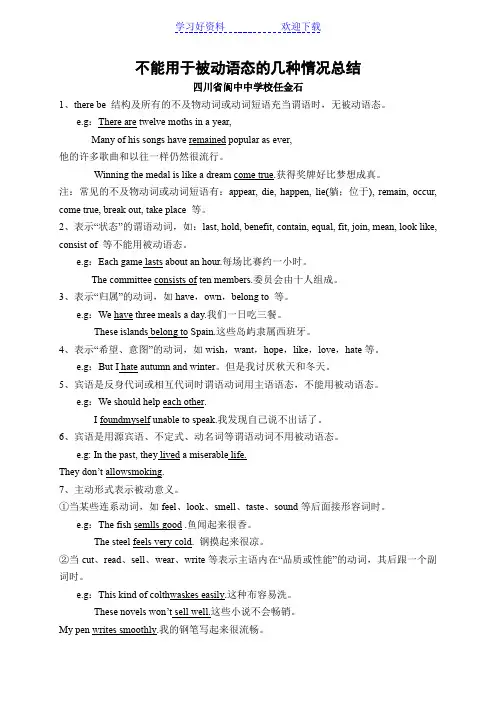
不能用于被动语态的几种情况总结四川省阆中中学校任金石1、there be 结构及所有的不及物动词或动词短语充当谓语时,无被动语态。
e.g:There are twelve moths in a year,Many of his songs have remained popular as ever,他的许多歌曲和以往一样仍然很流行。
Winning the medal is like a dream come true.获得奖牌好比梦想成真。
注:常见的不及物动词或动词短语有:appear, die, happen, lie(躺;位于), remain, occur, come true, break out, take place 等。
2、表示“状态”的谓语动词,如:last, hold, benefit, contain, equal, fit, join, mean, look like, consist of 等不能用被动语态。
e.g:Each game lasts about an hour.每场比赛约一小时。
The committee consists of ten members.委员会由十人组成。
3、表示“归属”的动词,如have,own,belong to 等。
e.g:We have three meals a day.我们一日吃三餐。
These islands belong to Spain.这些岛屿隶属西班牙。
4、表示“希望、意图”的动词,如wish,want,hope,like,love,hate等。
e.g:But I hate autumn and winter。
但是我讨厌秋天和冬天。
5、宾语是反身代词或相互代词时谓语动词用主语语态,不能用被动语态。
e.g:We should help each other.I foundmyself unable to speak.我发现自己说不出话了。
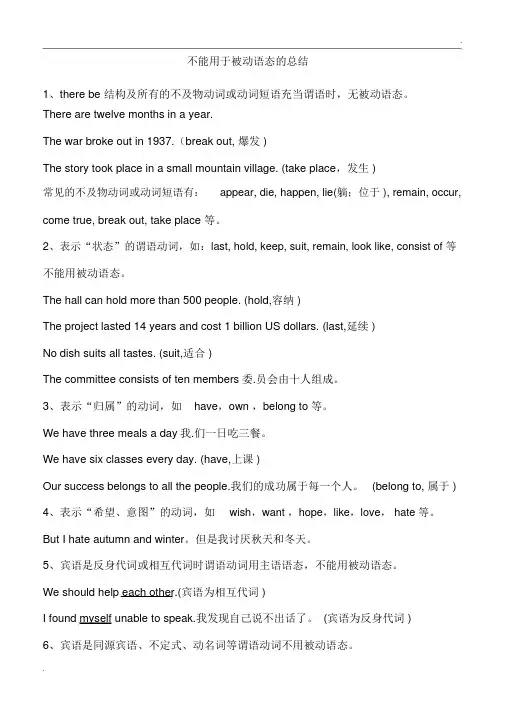
不能用于被动语态的总结1、there be 结构及所有的不及物动词或动词短语充当谓语时,无被动语态。
There are twelve months in a year.The war broke out in 1937.(break out, 爆发 )The story took place in a small mountain village. (take place,发生 )常见的不及物动词或动词短语有:appear, die, happen, lie(躺;位于 ), remain, occur, come true, break out, take place 等。
2、表示“状态”的谓语动词,如:last, hold, keep, suit, remain, look like, consist of 等不能用被动语态。
The hall can hold more than 500 people. (hold,容纳 )The project lasted 14 years and cost 1 billion US dollars. (last,延续 )No dish suits all tastes. (suit,适合 )The committee consists of ten members委.员会由十人组成。
3、表示“归属”的动词,如have,own ,belong to 等。
We have three meals a day我.们一日吃三餐。
We have six classes every day. (have,上课 )Our success belongs to all the people.我们的成功属于每一个人。
(belong to, 属于 ) 4、表示“希望、意图”的动词,如wish,want ,hope,like,love, hate 等。
But I hate autumn and winter。
无被动语态的动词除不与物动词无被动语态外,有另外六类动词无被动语态:1.某些表示静态的与物动词:have, suit,hold〔容纳〕,cost,suffer,last〔持续〕等。
He has a good car.〔不说:A good car is had…〕他有一辆好汽车。
They were having a bath then.〔不说:A bath was being had…〕那时他们正在洗澡。
The shoes don't fit me.〔不说:I'm not fitted by…〕这双鞋不适宜我。
He resembles his father.〔不说:His father is resembled by…〕他长得像他父亲。
The shirt suits me well.〔不说:I'm suited by…〕这衬衫很合我身。
The room can hold 500 people.〔不说:500 people can be held by…〕这房间能容纳500个人。
The book cost me five dollars.〔不说:I was cost five dollars by…〕这本书花了我5美元。
They suffered heavy losses.〔不说:They were suffered…〕他们损失沉重。
2.某些由与物动词转变的自动词(不需借助宾语即可表达动作,区别他动词,需要借助宾语表达动作)这类动词常见的有:promise〔有指望〕,sell,wash,write,wear,read,break out,run out,give out,add up to,take place,turn out〔证实〕,catch 〔挂住〕,等。
The goods sell well.〔不说:…are sold…〕这些商品畅销。
The clothes wash well.〔不说:…are washed…〕这些衣服好洗。
英语不能用被动语态的若干情况■不及物动词没有被动语态,如rise, happen, succeed, remain, lie, disappear, last等。
如:After the fire, nothing remained.那场大火之后,什么也没留下来了。
误:After the fire, nothing was remained.■不及物动词短语没有被动语态,如:take place, break out, belong to等。
如:Great changes have taken place here since 1990.自1990年以来这里发生了巨大的变化.误:Great changes have been taken place here since 1990.■有的及物动词也没有被动语态,如cost, leave, enter, reach, suit, have, wish,hold, own, lack, fit, resemble, jump, mind等。
如:She entered the room just now.他刚才进过房间。
误:The room was entered by her just now.Tom jumped the queue.汤姆插队。
误:The queue was jumped by Tom.■有些及物的短语动词也没有被动语态,如agree with, arrive at/in, shake handswith, succeed in, suffer from, happen to, walk into, belong to等。
如:I don’t agree with him.我不同意他的看法。
误:He isn’t agreed with by me. ()■宾语是反身代词、相互代词、同源宾语、不定式、v-ing形式及抽象名词等,都不能变为被动句子的主语,如:I taught myself French.我自学法语。
【高中英语语法语态】不用被动语态的情况I. 无被动语态的动词:除不及物动词无被动语态外,有另外六类动词无被动语态:1.某些表示静态的及物动词:have,fit,lack,resemble(像),suit,hold(容纳),cost,suffer,last(持续)等。
He has a good car.(不说:A good car is had…)他有一辆好汽车。
They were having a bath then.(不说:A bath was being had…)那时他们正在洗澡。
The shoes don't fit me.(不说:I'm not fitted by…)这双鞋不合适我。
He resembles his father.(不说:His father is resembled by…)他长得像他父亲。
The shirt suits me well.(不说:I'm suited by…)这衬衫很合我身。
The room can hold 500 people.(不说:500 people can be held by…)这房间能容纳500个人。
The book cost me five dollars.(不说:I was cost five dollars by…)这本书花了我5美元。
They suffered heavy losses.(不说:They were suffered…)他们损失惨重。
2.某些由及物动词转变的自动词:这些动词有人称之为主动形式,被动意义,也有人称之为自动词。
顾名思义,自动词是说动词的动作是由主语自身所产生的。
既然是主语自身产生的动作,就根本不存在被动语态了。
这类动词常见的有:promise(有指望),sell,wash,write,wear,read,break out,run out,give out,add up to,take place,turn out(证实),catch(挂住),等。
英语中不用被动语态的几种情况(最新版)编制人:__________________审核人:__________________审批人:__________________编制单位:__________________编制时间:____年____月____日序言下载提示:该文档是本店铺精心编制而成的,希望大家下载后,能够帮助大家解决实际问题。
文档下载后可定制修改,请根据实际需要进行调整和使用,谢谢!并且,本店铺为大家提供各种类型的经典范文,如词性大全、句法大全、句型大全、从句大全、时态大全、语态大全、语法大全、虚拟语气、用法辨析、其他资料等等,想了解不同范文格式和写法,敬请关注!Download tips: This document is carefully compiled by this editor.I hope that after you download it, it can help you solve practical problems. The document can be customized and modified after downloading, please adjust and use it according to actual needs, thank you!In addition, this shop provides you with various types of classic sample essays, such as part of speech, syntax, sentence pattern, clause, tense, voice, grammar, subjunctive, usage analysis, other materials, etc. If you want to know the different formats and writing methods of the model essay, please pay attention!英语中不用被动语态的几种情况1. 谓语为连系动词时,不用被动语态。
不用被动语态的情况1.不及物动词不能用于被动语态。
例如:The sun is rising. 太阳冉冉升起。
When did the thing occur? 那件事情是什么时候发生的?(错) The price has been risen.(对) The price has risen.(错) The accident was happened last week.(对) The accident happened last week.(错) The price has raised.(对) The price has been raised.(错) Please seat.(对) Please be seated.2.表示状态特征的系动词,如look, sound, feel, smell, taste, appear, seem, go, prove, turn, become, fall, get, grow, keep等的主动形式表示被动意义。
例如:It sounds very good. 听起来很好。
The food tastes so delicious. 那种食品美味可口。
3. read, write, wash, sell, wear, lock等动词和well, easily, smoothly等连用时,主动形式表示被动意义。
例如:The pen writes smoothly. 这笔用起来很流畅。
The coat washes easily. 这件大衣容易洗。
4.表示开始、结束、运动的动词不用于被动语态。
这类动词有begin, start, open, close, stop, end, shut, run, move等。
例如:Class begins at 8 o’clock.八点上课。
The shop closes at 7 o’clock.这家商店七点关门。
5.一部分动词用进行时表示被动意义。
不用或不能用被动语态的情况1. 不及物动词(vi.)没有承受着,所以是不可能用于被动语态的。
如:1)He went home.2)Mr. Li began to speak. The teachers and the students listened carefully.当然,不及物动词(vi.)后面跟上介词时相当于及物动词(vt.),就可以用于被动语态了。
如:Mr. Li began to speak. The teachers and the students listened to him carefully.→Mr. Li began to speak. He was listened to carefully by the teachers and thestudents.2. 有些表示状态的及物动词(vt.)(往往是不能用于进行时的vt.)如have、let、cost、hold(容纳,盛下)等,不表示动作,不可用于被动语态。
如:1)I have some new books. √→Some books are had by me. ×2)The bus holds fifty people. √这个汽车能坐50人。
→Fifty people were held by the bus. ×3. 当及物动词(vt.)所带的宾语是表示地点、处所(有时包括组织、团体)等时,一般不能改为被动语态。
如:1)He left Beijing. √→Beijing was left by him. ×2)He entered(走进)the classroom. √→The classroom was entered by him. ×3)He joined the English club last week. √→The English club was joined by him last week. ×说明:一般地说,判断一个主动句能否转换为被动句,主要看其宾语是否真的受到动作的影响,是否真的“被触及”了。
不用被动语态的N种情况
1.不及物动词不能用于被动语态。
例如:
The sun is rising. 太阳冉冉升起。
When did the thing occur? 那件事情是什么时候发生的?
2.表示状态特征的系动词。
如:look, sound, feel, smell, taste,
appear, seem, go, prove, turn, become, fall, get, grow, keep等的主动形式表示被动意义。
例如:
It sounds very good. 听起来很好。
3.表示开始、结束、运动的动词不用于被动语态。
这类动词
有begin, start, finish, open, close, stop, end, shut, run, move等。
例如:
Class begins at 8 o’clock.
4.read, write, wash, sell, wear, lock等动词和well, easily,
smoothly等连用时,主动形式表示被动意义。
例如:
The pen writes smoothly.
The coat washes easily.
5.一部分动词用进行时表示被动意义。
这类动词有:print,
cook, fry, hang, build, make等。
例如:
The novel is printing.
The supper is cooking.
6.need, want, require, deserve等动词以物做主语时,后接
动名词的主动形式表示被动意义。
My watch needs/ wants/ requires repairing.
Who said the boy deserves punishing.谁说那男孩应受到惩罚。
7.宾语是反身代词、相互代词、同源宾语时,不用被动语态。
例如:
I taught myself English.
We help each other.
They live a happy life.
8.一部分及物动词不用于被动语态。
常见的有:fit, have,
wish, cost, leave, enter, reach, suit, benefit(受益), lack, own等。
例如:
He entered the room and got his book.
I have a book.
9. 一些短语动词不能用于被动语态,如:break out, take place, lose heart(丧失勇气), come true, belong to, consist of(有……组成), add up to, agree with, arrive at/ in, shake hands with, succeed in, walk into(走进), suffer from(忍受,遭受),happen to,take part in等.例如:
The group, consisting of 5 people, has achieved its goals.
五人小组实现了他们的目标。
10.不定式to blame(责备), to seek, to let等用主动形式表
示被动意义。
例如:
The house is to let.此房出租。
Who is to blame for? 那件事情谁应该受责备?
11.不定式作定语与所修饰的名词构成动宾关系时,不定式用主动形式。
例如:
I have lots of work to do.
He is a pleasant person to get along with.他是一个很好相处的人。
12. 一部分形容词后接不定式做状语时,不定式用主动形式。
常见的形容词有:easy, hard, difficult, nice, kind, pleasant 等。
例如:
He is easy to deal with. 他容易相处。